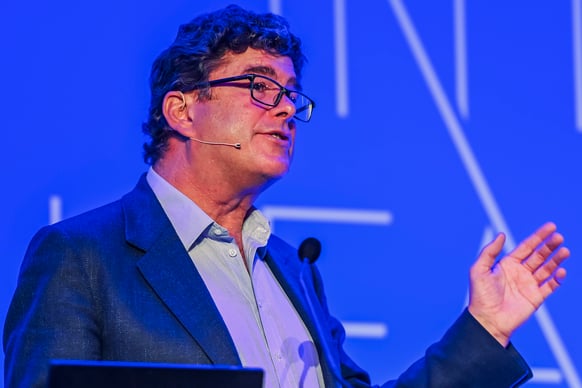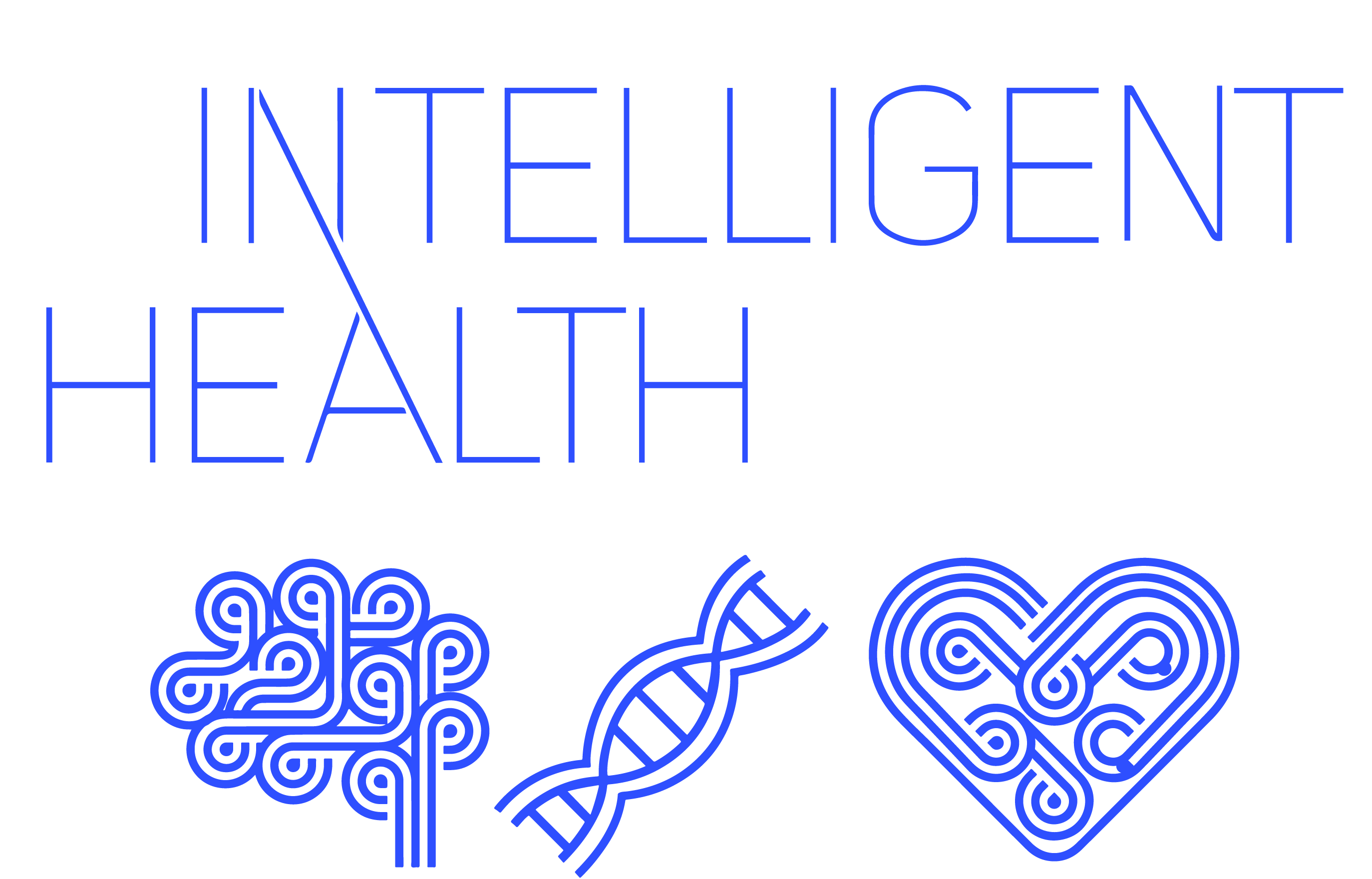“Machines will not replace physicians, but physicians using AI will soon replace those not using it.” - Antonio Di Leva, The Lancet
Following our pre-event Q&A with headline speaker Frank Hester OBE, I had the opportunity to sit down with Frank and delve a little further into what TPP’s mission is and where he sees the unexplored opportunities and potential misconceptions surrounding AI in Healthcare.

Meeting with Frank Hester and his team at TPP, and listening to his headline talk at the launch of Intelligent Health UK on “Maximising our digital infrastructure for a 21st century workforce”, two words spring to mind; passion and pragmatism.
Years of working in the banking industry led to a feeling that his work wasn’t having the kind of impact on society and customers’ lives that would really satisfy him, and this combined with the experience of seeing his GP wife struggle with spending too much time on admin rather than patient care, led to a career pivot and the founding of TPP.
Driven by the question of how doctors and the NHS can be helped to save time, or as he quotes Matt Hancock as saying, “Giving clinicians back the gift of time and allowing them to care”, Hester views AI as, “fantastic...our new toy. But it’s not a panacea.” He likens AI to a spellchecker - “it’s going to help me, not take over.”
In his 22 years in the healthcare industry, Frank has always viewed his key customers as the clinicians working across the estate, and therefore by extension, the patients and the outcomes that they get.
“What inspires us, and what we focus on, is what bits of technology can we apply that are going to make either a clinician caring for a patient’s life easier, or the actual patient themselves have better outcomes.”
“We’re not going to be judged by how clever, or how fancy our algorithms are. Where we’ll be judged is - does it make an impact across the healthcare estate? We’ve seen a number of innovations across sectors that are very very advanced and clever in what they do, but they don’t have the desired outcome, and they’re not deployed widely enough, because they don’t make enough of a difference. –The crucial point is that of course there’s huge potential in AI, and Deep Learning, but what matters more than the technology itself is really connecting with the problem we are facing and then choosing the technology that is both available and appropriate. Sometimes that can be really simple - just about making the record available. Sometimes it’s more complex, and that’s where we get into helping decision support for clinicians when they’re treating cases like ovarian cancer.”
As we move on to discuss the NHS, it’s clear that everyone in the business has to be passionate about helping the NHS face forthcoming challenges. “You cannot work in healthcare if you don’t have a passion for the NHS. It’s a very emotive topic. When I started the company, my wife was a GP and I saw those troubles she was facing.”
“It’s very very easy to be inspired by doctors and nurses across the NHS and when we’re talking about AI and the products we develop, everything from the customer base and the knowledge we accrue, giving back to the NHS is definitely part of that - it’s not about charging for different new applications, it’s really about giving more and more tools to give back, and that’s really something that we feel very strongly about. Anybody who doesn’t share that ambition, we don’t tend to work with. There’s got to be that desire to make a difference to people’s lives.”
Our conversation turns to the unexplored areas where AI can be of practical support next, and Frank is clear, “one of the big areas that as a technology company we’re going to look at, is although we supply software to clinicians primarily, when we’re talking about healthcare, the person we all care about is the patient who presents at hospital and GP practice. One of the things that’s often missing is the direct communication with the patient, for example patients access to their health record, being able to enter in information. What we’re also seeing with the advance in wearable technology and smart devices, is a whole new dataset that can be collected - from what they’re eating, how active they are, all things that have an impact on people’s health.”
“Even something as simple as you go into a doctors and they prescribe you some medication. What often is missing from the clinical records is - did you get better? Did you finish your course of medication? Did you have any side effects? So closing that loop and including the patients more and more in their care, is going to be vital, and that’s going to build a richer dataset that we can then use for more applications in the future.”
“Similarly a lot of the policy that’s coming out of NHS England and NHSX is about increased citizen engagement with their care. I think if we see more of that, that opens up far more potential to both grow the dataset we can work with, but also include and communicate with patients directly. So I think that’s a big thing.”
Frank’s equally clear about misconceptions surrounding AI in healthcare, and shares two common thoughts he’s working to dispel. “One is that it’s going to completely solve all our problems, and the other approach is that it’s going to somehow restrict or take away from the job that is being done by the healthcare professional, or even replace them. So they’re two perceptions we don’t feel. AI is not going to solve everything, and sometimes it’s not even the right technology to apply.”
“Equally, where it has greater power is through more intelligent decision support for doctors, to be able to assist them. What we can find is that anything from speeding up some of the administrative tasks, through intelligent workflow management, through to assisting with diagnosing during consultation. Those are things where it can augment that healthcare professional’s knowledge. So that is really about working with our existing healthcare workforce rather than seeking to replace them, it just does not have that potential.”
With Intelligent Health UK focusing on bringing together an ecosystem of diverse subject and functional specialists to tackle key healthcare issues, I couldn’t resist a last question on how TPP involves clinicians and other stakeholders in their research and planning.
“We work with a number of different clinicians, and when you’re talking about areas like earlier detection of cancer, one of the things that we’ve done is we’ve engaged a lot of the different charities. Because it’s a new area for us to look at, it’s obviously very emotive and very sensitive. A lot of the charities have years of expertise in terms of some of the problems that people experience, dealing with that condition in the healthcare system. One fantastic example is working with Target Ovarian Cancer and hearing the amount of time that is spent going in and training GPs on how to spot it because it is exceptionally difficult to spot. But due to the infrequency of the actual condition, they might not see it for a long period of time. Having an AI solution sitting beside a GP in the eight minutes they have to spot it, giving them a nudge, is very much welcomed.”
“So I really think that we have to work with people and we have to expand that net as wide as possible because people working in healthcare, from charities, through to clinicians, through to IT suppliers through to NHS commissioners, all have a different perspective, we have to pool that knowledge and use it better.”
Which collaborative note, perfectly in line with our own ethos at Intelligent Health UK, seemed like the perfect note to finish on.
To view the pre-event Q&A with Frank Hester, click here
GLOBAL AI EVENTS CALENDAR
Here is your Global AI Events Calendar where you can meet the Inspired Minds community of business leaders, heads of government, policy makers, startups, investors, academics and media.
WORLD SUMMIT AI AMERICAS
March 25-26th 2020
Palais des congrès de Montréal
Montreal, Canada
INTELLIGENT HEALTH
09-10 September 2020
Basel, Switzerland
WORLD SUMMIT AI
07-08 October 2020
Amsterdam, The Netherlands
WORLD AI WEEK
05-09 October 2020
Amsterdam, The Netherlands
INTELLIGENT HEALTH UK
2 & 3 February 2021
London, UK


